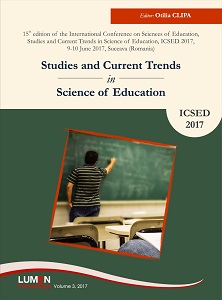Author(s): Mihaela Paisi-Lazarescu / Language(s): English
Publication Year: 0
The play facilitates the understanding, assignation, and strengthening of the learning outcomes, influences the development and maturity of personality, allowing the elaboration of more and more balanced cognitive structures and contributes to intellectual development. Didactic strategies of learning through play, which, without well-grounded reasons are considered to be less necessary along with ageing, are essentially euristic strategies ensuring an active learning as they situate the pupil in the centre of the learning activities. Having a direct contact with reality, looking for solutions, experiencing, making mistakes, etc., the child learns to build a reality he understands and he can use in very diverse situations. For the child, the play is not superficial and trifling, but, on the contrary, is a chance for learning. In play, the child finds himself as a protagonist of learning and not a simple receiver of information. Through its characteristics (the need for performance, risk, uncertainty, symbolism, intrinsic motivation, etc.) the didactic play as well as the role play claims a full deployment of all pupils’ psychical resources, ensuring a creative participation, elaborating its own cognition strategies, stimulating the initiative, capturing interest, involving emotion and attitude. The play offers the pupil the possibility to learn in a personal rhythm, to understand the surrounding reality to the best of is abilities. Learning through play is a constructivist learning in which pupils/children become active participants in building their own cognizance, improve their research and organizational abilities and communicate their personal ideas and affective condition.
More...

